There's a fine line between classic and poor design... and it sounds as if this game crosses it. Not being able to select which enemy to attack? I haven't seen that awful idea since Dragon Warrior II on the NES. All that does is remove a simple element of strategy and artificially increase difficulty, adding yet another element of luck.
Final Fantasy: The 4 Heroes of Light Review
|
|
See PixlBit's Review Policies

On 03/09/2011 at 08:00 PM by Nate Hascup A beautiful celebration of the classic, old-school RPG. |

Great for fans of old-school RPG gameplay.
Final Fantasy is one of gaming's longest-running and most prestigious series. It started humbly as the expected swan song for sinking Japanese game developer Square Soft, but its surprising success has made the series and its developer a forerunner in the gaming world. These days Final Fantasy seems to be caught up in its own limelight. The 4 Heroes of Light takes the now bloated and flashy cut scenes and increasingly complex gameplay formula and shakes it back down to its core. What stands in its place is a celebration of the series' roots.
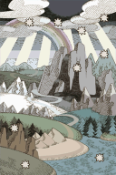
Square has done a lot of work releasing remakes of classic games recently. When this title was first revealed I thought it was a remake of the first game in the series. I was mistaken - this game is really more a remake of the genre reflecting its visage from years past. 4 Heroes of Light is not another modern JRPG getting lost in the crowd or yet another DS remake of an old favorite. It’s an imagining of what the genre was in the ‘80s with a new coat of paint and some shiny new parts like a superbly restored classic car.
The game starts off just like every other JRPG with a boy coming of age and setting off to be 'The One Hero'. Quickly you assemble your party of four heroes and confront the first boss. But then the game throws you for a loop by separating your party. You are down by two and the actions you performed seem to have broken some spell and your entire home village is turned to stone.
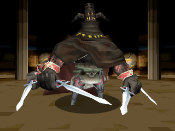
Throughout the game your heroes are paired up in different combinations. This is very disorienting and even unnerving. The departing characters take their goodies with them and you realize the importance of the storage chest found in each town. Those items can be taken out by any hero at any part of the game. After a while you adapt and forget about the switch up. Then it returns and each time the game changes up your party on you.
I was reeling from the loss of control, but after a while I began to like it. Was this a form of masochism I was developing after years of playing harsh games? Possibly, but I think it was the potential for the challenge it gave me. I had to earn back that control that gave me comfort and confidence in the game. One minute I've got a solid balance of roles in my group and no monster can touch me then -wham- I'm taken down a notch just when I start to get cocky and think the game is a breeze. I was forced to change up roles and strategies and deal with what items I was enough wise to save and store.
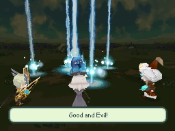
To help with the constant need to adapt your characters is a class system based on crowns. Throughout the game your party finds various crowns that can be used to enhance certain characters stats and bestow special skills. There's a crown for almost any situation. Healer crowns, fighter crowns, money-making crowns, even nonsensical crowns... you get the picture. Many of these crowns are essential to beating the game. You can't just strong arm your way through to the end. It's designed to prevent you from doing that for the most part. Bosses actually get stronger with you, so grinding in the traditional sense won't get you that far.
Upgrading crowns requires a vast collection of gems. Since gems are dropped by fallen monsters, I found myself not level grinding but gem grinding. Gems are used for everything. You upgrade weapons, armor and hats with gems and selling off gems at the market is the fastest way to build up some cash. When I was stuck on a boss I typically overcame them by either upgrading or changing my crowns. Many bosses felt more like puzzles with the way some crowns were just perfect for the battle at hand.
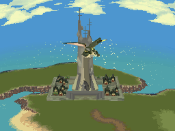
Some of the game's other design decisions are bold and surprising. Players are not given the same functions that might be taken for granted in this day and age. For instance, you can't select which enemy you attack in battle, turn order is difficult to ascertain, and manipulation of said turn order is difficult and cloudy at best. This makes it very difficult to plan strategy because you can’t anticipate whose turn is next. Item effects cannot be controlled either. Health restoration items automatically target the character with the lowest health, so you can forget about trying to save someone in particular. And if the enemy attacks first, there goes your item, and your turn is wasted on a different player.
The game simplifies things a bit by giving you universal 'Action Points'. These are built up and used to attack, cast spells, and utilize items. Different actions require a certain amount of points. Making up for the loss of strategy mentioned before, a lot of thought can go into deciding who will store up points for big attacks and who strikes each and every turn. These points are earned during combat and an interesting side effect of this is that spells you might want to use outside of battle for things like health recovery, expend these points as well. I found myself going into battles with the sole intent of building 'AP' for an upcoming boss fight. This also makes sleeping in inns mostly unnecessary as you can be fully self-sufficient in the field once you have a good team strategy in place. The only reason you might need to enter town is to purchase new equipment or unload extra equipment into storage. Frustratingly, your carry-on limit for questing is quite tiny, so extra trips to town are needed to properly equip for different environments and bosses.
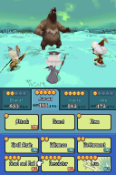
Farther in the game things start to drag with repetition and this is really one of the few big gripes I have with the game. This occurs when you start having to revisit and go through the exact same dungeons you did before. It ties to the story and the bosses are different, but just the same, it feels a bit off. Then, after revisiting every place again, you have to fight all of those new bosses again. This is very redundant and a large letdown. There is extra challenge this time around, but just the same they could have tried to spice things up a bit more at the stage of the game most needing a boost. This is the part where I can see most players bailing out.
Players can control the game via the touch screen or with the more traditional face buttons. Touch controls are akin to the DS Zelda titles, with the stylus controlling movement. Shortly after starting the game, I had switched permanently from touch to button controls as they were much more comfortable for movement. The touch controls feel slow and unresponsive. I suspect this is mostly due to the less action-oriented style of play, as you can't roll around or run fast or jump like you can in Zelda. Since the game is still very much a traditional JRPG there are no forced touch screen mini-games, eliminating any possible awkward switches back and forth between the two styles of play. You can settle for one style and stick with it exclusively.
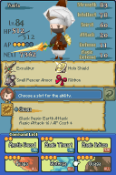
4 Heroes of Light's graphics are phenomenal for a DS game. One of the trends I've seen for DS RPGs is to incorporate rendered cut-scenes between play while trying to create a '3D' environment. Any DS user can tell you that the system has little-to-no anti-aliasing capabilities and the polygons tend to look like jaggy first generation PlayStation titles. Juxtaposing beautifully drawn anime between blindingly pixelated, jaggy 3D is distracting and frustrating. Here we have a different style with a much more cel-shaded look that is quite fitting for this type of game. I remember first seeing video for 4 Heroes and crying out, "That's it! That's how DS games should look!" The environments have a bright, colorful feeling about them that, combined with the music, make for some wonderfully drawn up settings.
And I find that music is the unsung (ha!) hero of the game. I didn't realize how strongly it affected my experience until one day I was playing without sound. From the crescendos when a bosses end is nigh to the sounds of twilight falling upon the earth at night, it really helps set the game’s mood. I especially love the music on the loading screen when you start up your game or quit for the day. The game flashes images of the places and people you have helped with music that brings up nostalgic RPG thoughts.
Despite the game’s glaring redundancy, it’s fun and a great challenge for gamers hankering for old-school RPG gameplay. It is a nice lengthy adventure with some great twists and turns along the way. Some of the tricks may be clichéd, but the execution of them is so well done that you tend to overlook the matter. Everything just works and the game both introduces fun new elements while staying true to its roots. Not an adventure for the weak gamer at heart or the easily defeated; Final Fantasy and the 4 Heroes of Light will reward those dedicated to pressing on and experimenting their way to victory in the face of challenge.







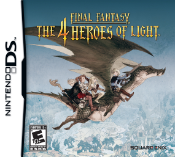

Comments